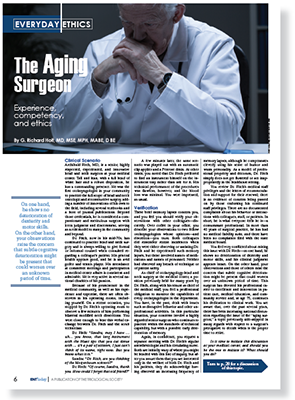 I enjoyed the thought-provoking article entitled “The Aging Surgeon” by G. Richard Holt, MD, (ENTtoday, August 2015). However, I have to take exception with the surgeon’s inability to name instruments during a surgery as an example used to signal a decline in mental function/physician ability. Another explanation for this inability is “flow,” as described by Mihaly
I enjoyed the thought-provoking article entitled “The Aging Surgeon” by G. Richard Holt, MD, (ENTtoday, August 2015). However, I have to take exception with the surgeon’s inability to name instruments during a surgery as an example used to signal a decline in mental function/physician ability. Another explanation for this inability is “flow,” as described by Mihaly
Explore This Issue
December 2015Csikszentmihalyi, PhD, the former chair of the Department of Psychology at the University of Chicago (Flow: The Psychology of Optimal Experience. 1990; New York: Harper and Row).
I went to medical school and did my residency and fellowship at the University of Chicago (sadly, no, I never had the opportunity to meet Dr. Csikszentmihalyi). Approximately two years after completing my fellowship I was faced with a difficult sinus case. My hands flew as the case progressed, and afterward, I felt spent, but giddy, as I realized I was in a “zone” where I lose all sense of self—no sense of bladder, no hunger, no bodily aches, and all sense of time is lost. It is literally painful to be pulled away. A charge nurse asking, “How long will you be? For staffing needs?” can trigger snappish behavior. With utter focus, I frankly am not able to converse with anyone, and communicating the names of instruments becomes difficult. Like the artist with sole control of their palette, one in the zone is better off grabbing instruments rather than asking for them. Such sessions end with a shaking satisfaction, yet significant fatigue. The zone is a double-edged sword, but in the end the benefits outweigh the costs; one comes to seek the zone like an addiction.
I sought an explanation for the zone. Engaging the right side of the brain made some sense and seemed to fit somewhat, but then I discovered Dr. Csikszentmihalyi’s work. He termed the process “flow” and very much described the exact process. As I had imagined, it is the same process in top athletes, dancers, etc. His work focused on the surgeon, even stating how it is a clear example of flow at work.
Dr. Holt’s article was excellent, and observing decline in aging colleagues is certainly a collective effort in which we must engage. We should have difficult discussions with an aging colleague when concern for patient safety becomes apparent. When noting inability to name instruments in particular, though, I would suggest the observer sit back and watch, and possibly be impressed.
Steven M Houser, MD
Associate Professor of
Otolaryngology, CWRU
MetroHealth Medical Center
Cleveland, Ohio
Response: I appreciate Dr. Houser taking the time to read and comment on the “Everyday Ethics” presentation on “The Aging Surgeon.” Dr. Houser is a highly respected, excellent academician, educator, and surgeon, and I value his perspective. As I understand his comments, Dr. Houser was indicating that, on occasion, when a surgeon is in the “zone” of focus during a procedure that is going exceptionally well, it would not be a concern if he/she might not name a particular instrument or prefer to reach for the instrument (safely, of course) so as not to be distracted from the smooth flow of the operation. I do get that and may have had the same experience from time to time over the 45 years of my surgical life. I am aware of the athlete’s “zone” and the writer’s “groove,” so what Dr. Houser is describing is likely a similar situation for surgeons.
However, by way of explanation, when I develop the scenarios for the Everyday Ethics presentations, they are partly based on real-world situations, and partly on a writer’s script, to emphasize certain points that are a prelude to the important part of the article—the discussion. In this particular scenario, I opted to have Dr. Archibald Fitch, the fictitious senior surgeon, exhibit a few behaviors that were equivocal for impairment, including the occasional forgetfulness of an instrument’s name, but which could indicate either an early memory loss or a variant of normal surgical actions. Then, based on the observations that other surgical capabilities appeared to be just fine, the reader was led to a discussion of how one knows when there is a concern for patient safety with a decline in a surgeon’s cognition and dexterity and what resources are available to a surgeon for identifying a problem. The American Medical Association and the American College of Surgeons are both addressing this issue, so it appeared to be a timely topic to me.
As a 71-year-old surgeon who still supervises residents in the clinic and operating room, it is, of course, an issue to which I am obliged to pay attention. As part of a large group of “baby boomer” surgeons, I welcome the national medical enterprise’s attention to this issue and look forward to the guidelines and recommendations that will surely be provided to assist us in a self-awareness assessment of our skills and competencies. I tried to emphasize in the article that, while external oversight is important for patient safety, it remains the primary responsibility of the surgeon to have a keen sense of awareness of his/her skills and mentation, and to seek additional assessments if there is a concern.
Many thanks to Dr. Houser for his insight and for emphasizing the potential for misinterpreting what might be entirely innocent and positive lapses in memory, reflected by a keen focus on a surgical procedure that is being performed exceptionally well.
G. Richard Holt, MD, MSE, MPH, MABE, D Bioethics